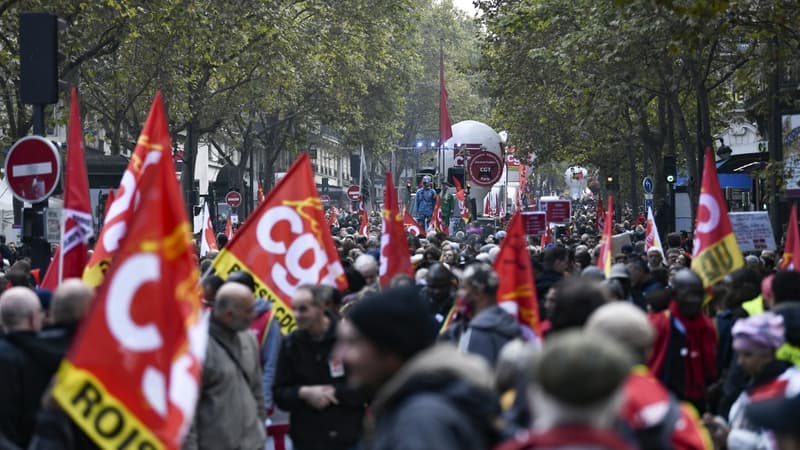Will Tuesday, October 18, be a black day? Four unions, the CGT, Force Ouvrière, FSU and Solidaires, called for a day of interprofessional mobilization with two demands.
On the one hand, demanding salary increases in a context of persistent inflation and, on the other hand, protesting against the searches of employees carried out in refineries and fuel depots that are perceived as affronts to the right to strike. BFM Business takes stock of the different sectors that plan to follow the movement.
• In transportation
Sector particularly scrutinized during the strikes, transport will be interrupted this Tuesday, October 18, following an appeal launched by CGT Cheminots and Sud-Rail. SNCF has already indicated that “traffic would be interrupted on certain TGV Inoui, Ouigo and TER trains”.
The Minister of Transport especially mentioned the possibility of ratios “of one train in two” in certain regions.
At the national level, one in two TERs will run on average. Interruptions are also expected on the TGV Atlantique and on the Ouigo network, as well as on the Eurostar and on links with Spain. Intercity train traffic will also be severely affected with half of the service provided during the day and the difficulties will be concentrated on the links between Bordeaux and Marseille, between Nantes and Bordeaux and on the Paris-Limoges-Toulouse route.
In the Paris region, metro traffic (managed by the RATP) should be normal or almost normal for lines 1, 2, 3, 3 bis, 4, 5, 7, 7 bis, 8, 9, 10, 11 and 14. Traffic is will be slightly affected (8 to 9 trains out of 10) for lines 6, 12 and 13. On the other hand, only three trains out of four will run on line A. The proportion will be similar for the south of line B while only half of the trains will run on line A. It runs north with an interconnection maintained at Gare du Nord.
The fare for the service will also be one in two trains for RER C and lines H and N. The most affected Ile-de-France residents will be those using lines J, L and R, as well as RER D, since only a third of the trains operate on these axes with an interruption in the interconnection between Châtelet-les-Halles and Gare de Lyon for the RER D. The service fee will be reduced for buses since only two out of three will be on the roads.
In addition, the Landy technical center, which deals with the maintenance of TGVs, on the Gare du Nord, Eurostars and Thalys network, voted in favor of the strike on Monday.
The CGT Transport Federation also called on truckers to “inflate the pickets”: “Road freight transport workers and, more particularly, those who contribute to the transport of hazardous materials stand in solidarity with the ongoing struggle.”
• In the energy sector
The expansion of the social movement in the ranks of EDF had made noise last week when the energy company launched a race against time to restart the largest number of nuclear reactors before this winter. According to the CGT, one of every two nuclear power plants would be affected by the strike, which could cause power cuts in certain companies.
• In education
In the school sphere, from Wednesday, October 12, a strike of professional high school teachers is planned. Seven unions call for a protest against Emmanuel Macron’s reform that provides for an increase in the number of internship weeks, which would jeopardize “success in exams and the continuation of studies”.
The movement could be followed more widely in the ranks of the National Education while teachers have until Monday night to decide. While the SUD-Education union has already supported the strike, the majority union in secondary education SNES-FSU, in particular, also announced its participation in a press release: “Employees from a large number of professional sectors have been mobilizing since months ago in their companies or their services to claim and win legitimate wage increases, better working conditions, quality jobs. Young people are also mobilizing, both for their living and study conditions and for an ambitious scholarship reform.”
Extracurricular activities will be particularly affected according to the coordinator of the CGT-Public Service Baptiste Talbot who mentions in the parisian a strike “very popular among the Atsem (support for children’s autonomy Editor’s note), in the nursery”. “Many of them followed the movement at the beginning of the school year, but their salary demands are still there, he recalls, the same happens with daycare centers where the movement should be very followed according to our information.
• In the health sector
The first union in the private hospitalization sector, the CFDT Santé-Sociaux called a strike in the for-profit nursing homes and clinics to demand wage increases.
The public service of hospitals is also affected by strike notices.
• In public service
In addition to the public hospital function, the state public function and the territorial public function also register strike notices.
“In view of the first elements that come back to us, there could be many strikers among road workers, technical but also administrative services or even agents from libraries and those from HLM offices”, he evokes in the parisian François Livartowski, from the civil service of the CGT.
This is the case of garbage collectors, many of whom should participate in the strike in several large cities.
• In the private sector
TotalEnergies is no longer the only private company affected by a social movement. The agri-food sector could face a massive mobilization of its employees when 50,000 of them had already participated in the September 29 strike.
In other sectors of activity, there will be disputes within the aeronautical manufacturer Dassault, the automobile group Stellantis and the industrial and technological group Safran where employees did not find satisfaction in the latest salary increases granted by management.
Source: BFM TV


